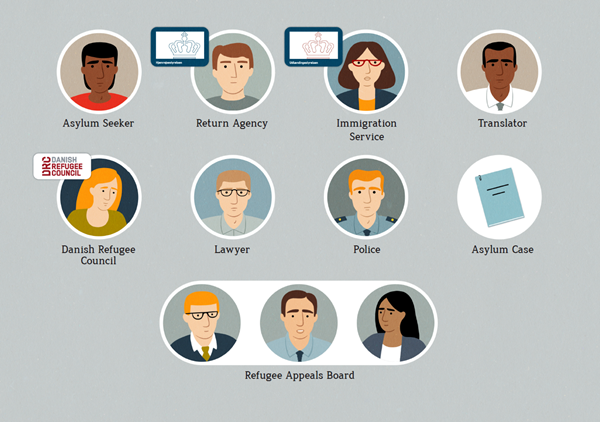Stakeholders in the Danish asylum system
Here you will find an overview of the authorities and organizations you may come into contact with as an asylum seeker.

Stakeholders in the Danish asylum system
If you want to apply for asylum in Denmark, you must first contact the Danish immigration authorities. You can either go to a local police station or to Reception Center Sandholm and inform the authorities that you want to apply for asylum. The asylum case must be registered with the Danish Immigration Service, which subsequently decides on the case at the first instance. If the Danish Immigration Service rejects an application for a residence permit as a refugee, the asylum case is automatically appealed to the Refugee Appeals Board, which is the highest deciding authority in asylum cases.
The Ministry of Immigration and Integration has the overall responsibility for matters relating to asylum, humanitarian residence permits, and family reunification.
You can read more about the Ministry of Immigration and Integration here.
The Danish Immigration Service is an authority under the Ministry of Immigration and Integration. The Danish Immigration Service makes decisions at the first instance in a wide range of areas within the Danish Aliens Act, e.g., in cases concerning asylum, family reunification, or other forms of residence permit.
In addition, the Danish Immigration Service is responsible for registration of new asylum seekers and recording biometric features (facial photos and fingerprints).
The Danish Immigration Service is also responsible for setting up and operating asylum centers, including deciding which asylum center an asylum seeker should stay at while the authority examine the asylum case.
If you have applied for asylum and are granted a residence permit as a refugee in Denmark, it is also the Danish Immigration Service that decides which municipality you should live in.
You can read more about the Danish Immigration Service here.
The Refugee Appeals Board is a quasi-legal, independent administrative body that acts as an appeal body in asylum cases. If the Danish Immigration Service rejects an application for a residence permit as a refugee at the first instance, the case is automatically appealed to the Refugee Appeals Board.
If your case is being examined by the Refugee Appeals Board, you have the right to be represented by a lawyer who is paid by the state. On the Refugee Appeals Board's website, you can find a list of lawyers who specialize in asylum and migration law. You have the right to choose a lawyer yourself, but if you do not, the Refugee Appeals Board appoints a lawyer for you.
Normally, as an asylum seeker, you are present at the board meeting at the Refugee Appeals Board together with the appointed lawyer. However, this does not apply to appeals in the accelerated procedures such as the manifestly unfounded proceedings as well as the Dublin and admissibility cases, where the case examination by the Refugee Appeals Board normally is conducted in writing.
At a board meeting, three board members decide on the case: a judge, who acts as chair of the meeting, and two members who are nominated by respectively the Danish Bar and Law Society (Advokatsamfundet) and the Ministry of Immigration and Integration.
The Immigration Appeals Board is an independent, quasi-judicial administrative body that acts as an appeal body in immigration cases, such as decisions on family reunification, permanent residence permits, administrative rejection, etc. The Immigration Appeals Board does not deal with cases concerning asylum.
Normally, you do not have to appear before the Immigration Appeals Board yourself, as the Board examines the cases in writing. You do not have the right to a lawyer appointed free of charge like with asylum cases examined by the Refugee Appeals Board.
The Danish Return Agency is an authority under the Ministry of Immigration and Integration. If you are denied asylum, the case is referred to the Danish Return Agency, which is responsible for ensuring that you as a rejected asylum seeker leave Denmark and return to your home country.
If you have been denied asylum by the Refugee Appeals Board, the Danish Return Agency will be responsible for accommodation while they are planning your return. The Danish Return Agency is also responsible for the transfer if you have been rejected in the Dublin or the admissibility procedure.
The Danish Return Agency carries out return proceedings if they are not associated with coercion or the use of force. If the authorities want to deport a rejected asylum seeker with the use of force, the Danish Return Agency cooperates with the police.
If you have been denied asylum and do not wish to leave Denmark voluntarily, the police will assist the Danish Return Agency in carrying out the return.
Previously, the North Zealand Police, Immigration Center North Zealand (UCN), was responsible for returning asylum seekers, but since 1 August 2020, the Danish Return Agency has taken over voluntary return.
The Danish Prison and Probation Service administers the prisons in Denmark. As an asylum seeker, you can be detained under the Danish Criminal Code if you have committed a crime.
In addition, the Danish Prison and Probation Service administers the prison called Ellebæk Center for Foreigners that is placed next to reception Center Sandholm. Here asylum seekers can be detained under the Aliens Act to secure their presence in connection with the forced return.
The Danish Prison and Probation Service also administrates the Departure Centers Kærshovedgård and Sjælsmark, where asylum seekers are accommodated while they are awaiting return from Denmark. This applies to asylum seekers, who have had their asylum application finally rejected and are to return to their home countries, as well as to asylum seekers in the Dublin or admissibility procedures, who are to be transferred to another European countries. Departure Center Sjælsmark is administered together with the Danish Red Cross.
If you have had your residence permit revoked as a refugee due to crime or are excluded from obtaining a residence permit as a refugee due to serious crime such as war crimes or crimes against humanity but cannot be sent back to your home country because you will be at risk of persecution or torture, your stay in Denmark is called “tolerated stay”. Generally, all persons on tolerated stay are obliged to stay at the Departure Center Kærshovedgård.
Asylum seekers who have had their application for asylum finally rejected but do not cooperate with the planning of their return are not on tolerated stay, but they can also be required to stay at Kærshovedgård.
DRC Danish Refugee Council is a private, humanitarian organization that works independently of the authorities. DRC's activities aim to provide protection for displaced people and promote long-term solutions – both in Denmark and around the world.
DRC has operations in about 40 countries and the international activities include humanitarian assistance, management of refugee camps and legal aid.
DRC asylum
At DRC Asylum, asylum seekers and refugees in Denmark can receive impartial counselling and legal aid. In addition, DRC Asylum has a role in the Danish procedure for manifestly unfounded asylum applications, provides legal aid and representation for asylum seekers in the Dublin and admissibility procedure, where the authorities consider transferring an asylum seeker to another European country, drafts reports the countries from which the asylum seekers come, participates in resettlement missions together with the Danish Immigration Service, comments on new proposals for asylum and migration legislation and provides counselling to refugees or other persons who have a residence permit in Denmark and wish to return to their home country (repatriation).
DRC Voluntary Advisory Services
DRC's Voluntary Advisory Services provide counselling and legal aid to refugees and migrants with a residence permit in Denmark about other topics than asylum. They can answer questions about the possibilities for family reunification, the Integration Act, the Active Social Policy Act, as well as other legal, psychological, or social matters.
The Voluntary Advisory Services are staffed by social workers, lawyers and psychologists, all of whom work on a voluntary basis. Advisers are bound by a duty of confidentiality.
Read more about the Voluntary Advisory Services and the volunteer department's other offers here.
The Danish Red Cross is part of the international Red Cross cooperation, which assists people in need all over the world.
The Danish Red Cross runs the asylum centers in Denmark in the same way as the municipalities. The centers are located all over Denmark, and asylum seekers are usually accommodated at the centers while their case is processed.
The municipalities are responsible for integration of refugees who have been granted a residence permit in Denmark. The municipalities organize introductory programs and are responsible for providing housing to refugees.
In addition, there are several municipalities that are also responsible for the management of asylum centers in the same way as the Danish Red Cross. The centers are located all over Denmark, and asylum seekers are usually accommodated at the centers while their case is processed.
Municipalities are also responsible for the well-being of children who are in the asylum procedure or have been granted residence. This means that the individual municipality is responsible for all children who stay in the municipality and must ensure that they are treated in accordance with their best interests.
The municipality therefore has an obligation to act and help if a child is not doing well. This applies both to children who have applied for asylum with their families and to unaccompanied minor asylum seekers.

Overview of stakeholders in the Danish asylum procedure.